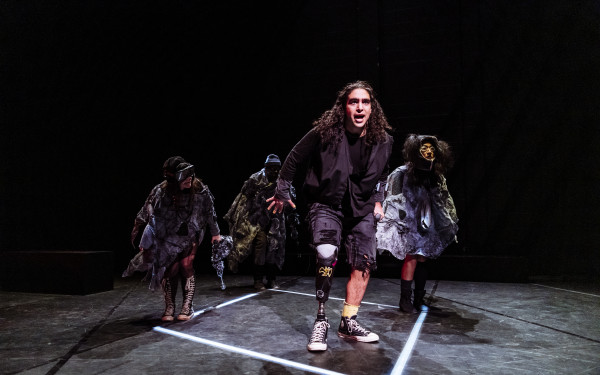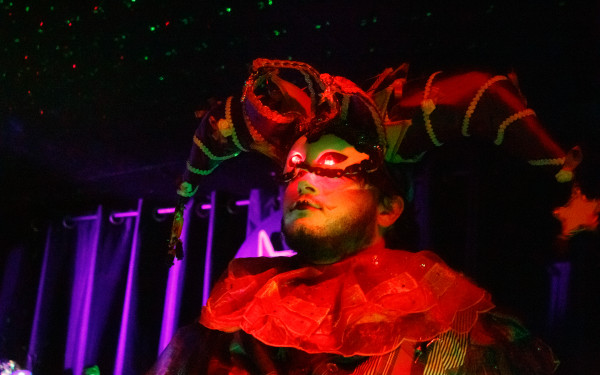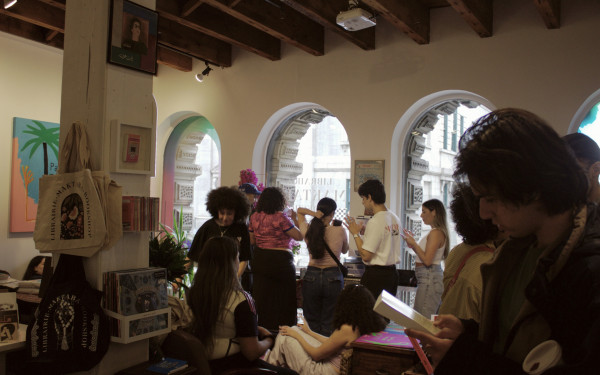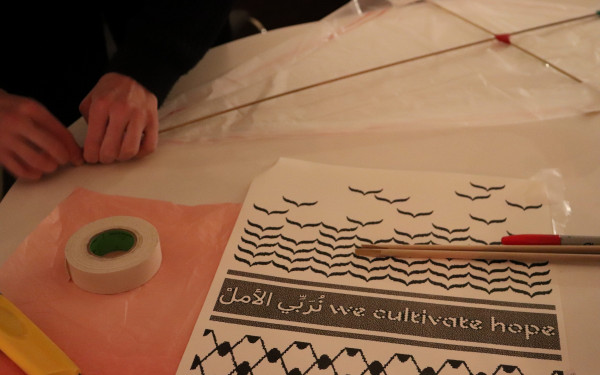Finding humanity in Palestinian life under occupation
Keffiyeh/Made in China is a powerful piece that counters the dehumanization of the Palestinian people
Keffiyeh/Made in China is a refreshing insight into the lives of a dehumanized people.
A compelling study of casual resistance by simply choosing to live, the play is a collection of 10 short stories written by Dalia Taha, each representing different moments in the lives of Palestinians living in Palestine, under occupation.
Though not always the main focus of the play, the occupation and its consequences on the characters’ daily lives loom in the background of every interaction. The occupation is the omniscient eye that watches over them, threatening to alter their lives forever at any given point. For some, the threat becomes reality: when they are imprisoned, asked to identify the body of their supposedly dead child, or unable to cross checkpoints.
Directed by Chelsea Dab Hilke, the piece features five actors—Basma Baydoun, Rahul Gandhi, Joy Ross-Jones, Hiba Sleiman and Aladeen Tawfeek—and over 20 different characters. A tragicomic piece, the actors vacillate between comedic relief and tense exchanges to blend the mundane with the abnormal, illustrating the absurdity of their day-to-day lives.
The set connects each story to the others. Set and costume designer Diana Uribe decided to place all the props on the stage before the start of the play so that the actors could set the scene before each short play.
For both the director and the set designer, this represents how they choose which stories to tell of the hundreds of thousands that happen each day in Palestine. As they cannot encompass the globality of Palestinians’ experiences while undergoing ethnic cleansing, they chose snippets widely different in tone and theme to showcase as much as possible.
Uribe describes this approach as being “little windows in a building, each one the place where stories are told, and we’re opening just a few.”
The dialogue in the fifth play, titled “Business,” is the sharpest. Depicting a Belgian tourist looking to buy a keffiyeh from a merchant adamant on selling her a blue bra, the play tackles the issue of dark tourism—tourism involving travel to places historically associated with death, disaster and tragedy—and Westerners’ unwillingness to engage in the politics of the disaster. The conversation goes in circles, and the audience is left frustrated with the exchange.
Several times, the tourist states that she “[doesn’t] do politics,” then asks for a keffiyeh. When the merchant tries to sell another symbol of Arab resistance against oppressive regimes, she gets mad, not understanding that the keffiyeh—or any piece of Palestinian heritage, really—is also inherently political. They are lost in translation, and the story ends with the foreigner leaving for another shop.
This short also marks the strongest performance of the play, with Baydoun as the uncomfortable European and Tawfeek as the intrusive and insistent vendor.
The beginning and end of the play are also emotional, bringing it full circle with grief, rage and helplessness at the centre of the story. In both, two parents deal with the implied loss of a child to the occupation. The plays never explicitly mention the fate of their son, instead highlighting the parents’ denial in an attempt to postpone the inevitable.
When the lights go down, the audience is left to wonder what will happen to these characters. Spectators may have spent no more than a few minutes with each of them, yet their story remains with us long after they have left the stage.
Uribe was excited to work on this production from the start. She wanted to be part of a meaningful play centring on the stories of Palestinians to raise awareness.
“When Chelsea [Dab Hilke] asked me to do it, I was, like, ‘Yes, let’s do it, let’s spread the words, let’s put this into life instead of being just paper,’” Uribe said.
On the other hand, Dab Hilke was initially hesitant to direct the play. She says the urgency of the politics in the text was an added pressure.
“All theatre is political, as far as I’m concerned, but sometimes, the politics [are] a little bit further away—either historically or [are] a little bit more abstracted,” Dab Hilke said. “It’s the idea or the theme of certain politics. But it’s not happening right now, in front of our faces, affecting [our] day-to-day lives.”
She was also concerned with issues of representation. Not Palestinian herself, she felt the play should be directed by someone from the community.
“I was [then] reminded of a quote [by Donna-Michelle St. Bernard],” Dab Hilke said. “‘You shouldn’t write other people unless you love them.’ And that was the key for me—that Dalia wrote these people, these characters, these stories, because she loves them, and she loves her community. And all my job was, was to take that love and put it on stage.”
Overall, Keffiyeh/Made in China is a powerful account of survival and perseverance against a system designed for Palestinian erasure.
“I see each one of these stories as a love letter from Dalia to Palestine, to Palestinians, to the community,” Dab Hilke said. “And we’re asking the audience […], ‘How are you willing to reply?’”
Keffiyeh/Made in China runs until April 26, 2025, at Cité-des-Hospitalières.

_2_900_600_90.jpg)





